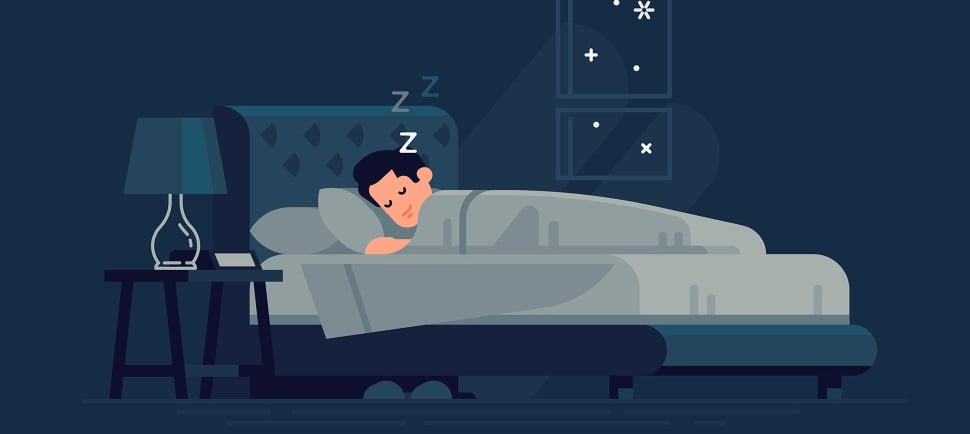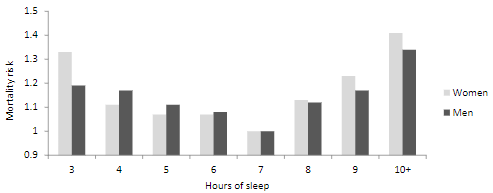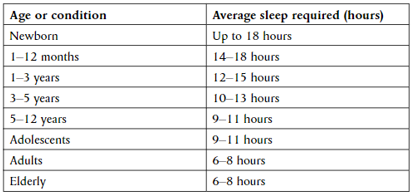The Importance of Sleep
Ensuring sufficient sleep is paramount for all individuals. The ramifications of sleep deprivation extend far beyond mere tiredness, encompassing a plethora of adverse effects that can ultimately curtail lifespan and compromise overall well-being. Whether you're an athlete, a student, an entrepreneur, or simply navigating daily life, prioritizing quality sleep is indispensable for long-term health and happiness. This article delves into the recommended duration of sleep, the detrimental consequences of inadequate rest, and actionable strategies to promote quality sleep, empowering readers to prioritize their sleep hygiene for optimal vitality.
RECOVERY
7/9/20248 min read


What is Sleep?
Sleep is defined as the natural, periodic state of immobility where the individual is relatively unaware of the environment and unresponsive to external sensory stimuli [2]. When asleep, nearly all voluntary muscles become inactive and metabolic rate is reduced [2]. The brain, however, is far from inactive [2]. Sleep occurs in 90-minute cycles switching between two main types of sleep phases called non-rapid eye movement sleep (NREM) and rapid eye movement sleep (REM) [3]. There are also two other phases known as the falling asleep and light sleep phases [3]. During the NREM and REM phases, the brain is very active. During the NREM phase, the brain experiences a sensory blackout (i.e., it no longer receives signals that normally become conscious perceptions) and transfers memories from the short to long-term memory, imprinting the prior day’s new experiences and knowledge learned in its memory [3]. During the REM phase, the brain integrates new information with old memories to create an overall more accurate understanding of the world, which is a critical process to developing new insights and solving problems [3]. Dreaming also happens in the REM phase. Losing out on either NREM or REM sleep can have serious health and life longevity implications [3].
How Much Sleep Do We Need?
The actual amount of sleep required is genetically determined and therefore varies between people. It is generally considered that the optimal amount of sleep for human adults is between 7 and 8 hours per night in a single consolidated period because this allows us to benefit most from alertness, improved mood, sound memory, and good health [2]. Too little or too much sleep over prolonged periods can be detrimental, and both are associated with increased mortality as shown in Figure 1 below [2].
Figure 1. Relationship between sleep duration and mortality risk in women and men. Data from: Green, A., Westcombe, A., (2012). Sleep: Multi-Professional Perspectives. Jessica Kingsley Publishers.
The required amount of sleep changes throughout our lifespan [2]. As seen in Figure 2 below, newborns and young children require more sleep so that they can develop and function normally [2]. Adolescents also require more sleep, and their sleep timing tends to be delayed compared with children and young adults [2]. As the years progress through adulthood, sleep duration tends to shorten and sleep occurs earlier, particularly in old age [2]. Although the consolidated nighttime sleep appears much reduced in the elderly, it is often made up by daytime naps [2].
Figure 2. Average sleep requirements throughout the lifespan. Data from: Green, A., Westcombe, A., (2012). Sleep: Multi-Professional Perspectives. Jessica Kingsley Publishers.
Generally, women and men have similar sleep requirements, but women’s sleep alters with the menstrual cycle, pregnancy, and menopause [2]. This is because the secretion of certain hormones, such as estrogens and androgens, affects sleep [2]. These hormonal changes can, for example, cause premenstrual and post-menopausal insomnia, increased NREM sleep during early pregnancy and during lactation [2].
Maintaining a regular daily schedule strengthens the circadian rhythm making sleep easier to achieve at the chosen bedtime [2]. Disruption of the circadian rhythm by keeping a chaotic sleep schedule, by doing night shift work or by regularly switching time zones can make sleeping difficult [2]. This is clearly demonstrated by the effects of jet lag [2]. Similarly, the process of being aroused, anxious, or alert may overcome either of the sleep promoting processes and is one of the main mechanisms involved in the complaint of insomnia [2].
What Are the Consequences of Inadequate Sleep?
Inadequate sleep affects all aspects of our physiology including cognitive impairment, mood changes and hormonal abnormalities, and exacerbating certain mental and physical disorders [2]. When people regularly sleep for less than 6 or 7 hours a night, they become more vulnerable to a whole host of serious health problems.
Sleep deprivation (even 1-2 hours less than the requirement) leads to increased cortisol levels and elevates heart rate and blood pressure, which increases the risk of developing and/or dying from heart disease by 45 percent [3].
Increased cortisol levels encourage fat storage. Feeling tired from inadequate sleep reduces willpower and increases the urge to eat calorie-dense foods for a quick energy fix. As a result, this leads to weight gain. And over time, the ability to regulate blood sugar is markedly impaired, intensifying the risk of type 2 diabetes [3, 4].
Reduced sleep destroys our immune system, which releases cells that remove toxic elements from our bodies. One night of no sleep results in a 70 percent loss of these killer cells that help fight off toxic elements that cause disease [3]. In fact, regularly sleeping less than 6 hours increases your risk of developing cancer by 40 percent [3].
A lack of sleep is associated with a heightened risk of developing Alzheimer’s disease and other diseases associated with dementia [4].
Inadequate sleep contributes to psychiatric conditions like depression and anxiety and significantly reduces the ability to experience pleasure and positive emotions [4].
Sleeplessness also affects our sexual energy. After one week of sleeping 4-5 hours a night, men have been found to have the testosterone levels of someone ten years older [4]. Sleep is also vitally important for women’s health and sexuality. For one thing, women need to restore the body in different ways as it transforms throughout the menstrual cycle. Scientists have found that for every hour of sleep that a woman loses, she has about a 14 percent decrease in her desire to be physically intimate with her partner [4].
How to Get Adequate Sleep?
Assess and Prioritize Your Sleep. Focus on giving yourself a long enough sleep opportunity each night, because it takes time for most people to fall asleep and people are often wakeful at certain points during the night [3]. Therefore, factor in that lost sleep time when figuring out your bedtime. It is generally considered that the optimal amount of sleep for human adults is between 7 and 8 hours per night [2]. If your alarm clock wakes you up, you haven’t slept enough [3]. Ideally, you should wake up a little before your alarm goes off [3]. You can start by giving yourself at least eight and a half hours in bed each night [3]. Thirty minutes to fall asleep and eight hours to sleep. You can also set an alarm for when to start your bedtime routine; consider starting your routine an hour before getting into bed [3].
Set a Regular Schedule. Go to bed at the same time and wake up at the same time; no matter whether it’s the weekday or the weekend. Regularity will reinforce your circadian rhythm, anchor your sleep, and improve the quality and quantity of that sleep [2, 4].
Keep Your Room Cool. Your body needs to drop its core temperature by about 2-3 degrees Fahrenheit to initiate sleep and to stay asleep. It’s the reason why you will always find that it is easier to fall asleep in a room that is too cold than too hot. So, aim for a bedroom temperature of around 65 degrees Fahrenheit or 18 degrees Celsius, which will be the optimal temperature for the sleep of most people [3, 4].
Limit Bedtime Food and Fluid Intake. Digesting food, especially highly processed, high fat and carbohydrate-rich foods can prevent you from being able to fall or stay asleep [3]. Healthy late-night snacks such as fruit can also provide bursts of energy that hinder sleep as well as eating too few calories during the day [3]. Eat a balanced diet during the day and stop at least two hours before you go to sleep [3]. Drinking water or other liquids within a couple of hours before bed can mean nighttime bathroom trips. Each time you wake up to use the bathroom, your sleep quality and quantity are impacted. Sugary or caffeinated evening drinks will further hinder sleep by providing energy. Avoiding food too close to bedtime will help limit liquid since we tend to drink to wash down food.
Limit Caffeine in the Afternoon and Evening. It is normal to have a drop in energy in the afternoon, and it typically passes in a couple of hours. Rather than refueling with caffeine, use this time for low level activities or, if possible, take a nap or go for a walk [3]. Caffeine has a quarter life of twelve hours, which means one quarter of one cup of coffee at 12 p.m. will still be in your brain at 12 a.m. [4]. Even if you fall asleep and stay asleep, caffeine can decrease the amount of NREM deep sleep by 15-20 percent [4].
Avoid Sleeping Pills. Sleeping pills do not promote true sleep. They cause sedation and interfere with the natural NREM and REM sleep cycles [3]. The brain’s important nighttime work is suppressed and, although you might not be awake during the nighttime hours, you are suffering the effects of your brain’s inability to perform its essential tasks. Sleeping pills often lead to grogginess the next day, which can lead to more caffeine dependency [3].
Avoid Alcohol. Alcohol often causes fragmented sleep [4]. Avoid alcohol unless you have nothing you need to do the next day. Like sleeping pills, alcohol is a sedative. It may help you fall asleep, but it will not help you stay asleep. It can cause bouts of waking up, feeling hot, sweaty, and dehydrated with your heart racing [3]. The tiredness felt the day after drinking can lead to excessive caffeine and high calorie foods to help boost the body’s energy levels [3]. While this is fine and fun on occasion, it can have negative consequences if you need to rely on your brain to perform optimally the next day.
Limit Electronic Devices Close to Bedtime. Most electronic devices emit blue LED light, which fools the brain into thinking that it’s still daytime and delays the release of melatonin, making it harder to fall asleep [3, 4]. Indoor lighting can also hinder the production of melatonin [4]. A few solutions to this problem are as follows. Avoid electronics at night and dim/turn down the lights in your home when your alarm alerts you that it’s time for bed [3, 4]. Install blackout curtains to block out streetlights or the morning sunrise [3, 4]. If you are going to use electronic devices close to bedtime, wear screen glasses designed to reduce the amount of blue light that hits your retinas [3]. Lower your television’s brightness setting. Use the dark mode option on your devices. Switch off notifications after a certain time or even better switch off notifications for everything that you don’t need to be notified about in the evening, such as work emails. You can also purchase smart bulbs that have color options and use the red setting during the evening [3].
Exercise Consistently. Consistent exercise can improve sleep quantity and quality [1, 3]. Studies have shown that exercise can increase REM sleep, sleep continuity, and sleep efficiency [1]. Furthermore, engaging in regular resistance exercise improves the quality of sleep and can reduce the time required to fall asleep [1]. It is also important to note that key measures of fitness and body composition are associated with poor sleep quality [1]. Exercising regularly helps regulate hormones, chemicals, and appetite; and therefore, is an effective intervention for improving body composition and fitness, which in turn will improve sleep quality and quantity [1, 3].
Conclusion
We spend a large proportion of our time sleeping, and there is a legitimate reason why we do. Inadequate sleep affects all aspects of our physiology. When we don’t get enough sleep, our cognition becomes impaired, we experience mood changes and hormonal imbalances, and our cortisol levels rise leading to weight gain. Therefore, it is crucial that we try our best to do everything we can to prioritize getting 7-8 hours of sleep each night. Follow the recommendations outlined above, and you will live a longer and happier life as a result.
Sources
[1] Dolezal, B. A., Neufeld, E. V., Boland, D. M., Martin, J. L., & Cooper, C. B. (2017). Interrelationship between sleep and exercise: A systematic review. Advances in Preventive Medicine, 2017, 1–14. https://doi.org/10.1155/2017/1364387
[2] Green, A., Westcombe, A., (2012). Sleep: Multi-Professional Perspectives. Jessica Kingsley Publishers.
[3] McCracken, J., (2021). The Importance of Sleep and How to Get It. Tennessee Bar Journal, 57(6), 38 42. Retrieved from http://ezproxy.umgc.edu/login?url=https://search.ebscohost.com/login.aspx?direct=true&db=asn&AN=153807861&site=eds-live&scope=site
[4] Robbins, A., Diamandis, P., & Hariri, R. (2022). Life force: How new breakthroughs in precision medicine can transform the quality of Your Life & Those You Love. Simon & Schuster.




Copyright © 2024-2025 AnlianFitness. All rights reserved.
Follow us on social media.
